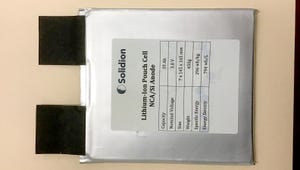Supply-Chain Woes Cited as Volta Trucks Files for Bankruptcy
Sweden-based electric truck maker’s decision follows the August bankruptcy of its battery supplier, Proterra.

Volta Trucks, the four-year-old Stockholm-based startup that developed the Volta Zero commercial electric truck, has declared bankruptcy, citing supply-chain woes.
“With deep and sincere regret, the Board has … taken the difficult decision to take steps to file for bankruptcy proceedings in Sweden,” and would also file for bankruptcy in the UK, the company announced in a statement.
The firm had raised about $316 million from investors and reportedly had about 5,000 pre-orders for the Volta Zero. So, what happened?
Proterra bankruptcy’s ripples
Volta Trucks' declaration follows the Chapter 11 bankruptcy protection filing of battery developer and electric bus maker Proterra in August.
“The recent news that our battery supplier (Proterra) has filed for Chapter 11 Bankruptcy, has had a significant impact on our manufacturing plans, reducing the volume of vehicles that we had forecast to produce. The uncertainty with our battery supplier also negatively affected our ability to raise sufficient capital in an already challenging capital-raising environment for electric vehicle players,” the company statement noted.
Proterra had reported a loss of $250 million in the first quarter of 2023, five times more than in the same quarter in 2022, prior to its Chapter 11 filing, according to Semafor, and its own earnings report had noted that it had “spent $6.5 million more on materials for its products in the first quarter than the revenue those products generated.”
The Volta Zero had an innovative design and Volta Tucks had enthusiastic investors and had targeted an IPO in 2024. But a great design and enthusiastic backers weren’t enough in the end to protect it from its necessary dependence on a supply chain that proved to be unstable.
About the Author(s)
You May Also Like





